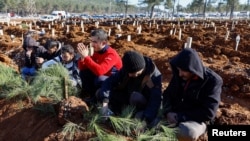Hopes faded Thursday of finding more survivors after the earthquake that killed nearly 20,000 people in Turkey and Syria.
It was the biggest natural disaster to strike the region since 1999, when a similarly powerful quake killed more than 17,000 people in Turkey.
On the ground, many people in Turkey and Syria spent a third night sleeping outside or in cars in freezing winter temperatures, their homes destroyed or so shaken by the quakes they were too afraid to re-enter.
Hundreds of thousands of people have been left homeless in the middle of winter. Many have camped out in makeshift shelters in supermarket car parks, mosques, roadsides or amid the ruins, often desperate for food, water and heat.
An aid convoy reached rebel-held northwestern Syria Thursday, the first since a devastating earthquake that has killed thousands, an official at the Bab al-Hawa border crossing told AFP.
"The first UN aid convoy entered today," said Mazen Alloush, media officer at the crossing.
The International Organization for Migration (IOM) said in a statement the delivery includes blankets, mattresses, tents and "basic relief items... to cover the needs of at least 500 people".
"We are working very closely with authorities to support in any way we can and hope that aid will quickly reach those most impacted," said IOM head Antonio Vitorino.
The aid delivery mechanism from Turkey into rebel-held Syria through the Bab al-Hawa crossing is the only way UN assistance can reach civilians without passing through areas controlled by Syrian government forces.
At a gas station near the town of Kemalpasa, Turkey, people picked through cardboard boxes of clothes dropped off as donations.
In the port city of Iskenderun, Reuters journalists saw people huddled round campfires on roadsides and in half-crushed garages and warehouses. The only lights were the spotlights focused on cranes trying to remove slabs of debris.
Authorities say some 6,500 buildings in Turkey collapsed and countless more were damaged in the quake zone where some 13 million people live.
In the devastated Syrian town of Jandaris, Ibrahim Khalil Menkaween walked in the rubble-strewn streets clutching a folded white body bag. He said he had lost seven members of his family including his wife and two of his brothers.
"I’m holding this bag for when they bring out my brother, and my brother’s young son, and both of their wives, so we can pack them in bags," he said. "The situation is very bad. And there is no aid."
A Turkish official said the disaster posed "very serious difficulties" for the holding of an election scheduled for May 14 in which President Tayyip Erdogan has been expected face the toughest challenge in his two decades in power.
With anger simmering over the slow delivery of aid and delays in getting the rescue effort underway, the disaster is bound to play into the vote should it still go ahead.
This report was compiled from Reuters and Agency France-Presse.








